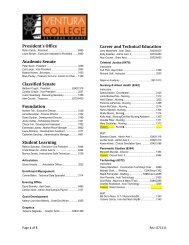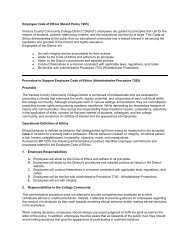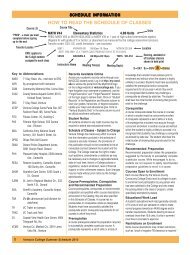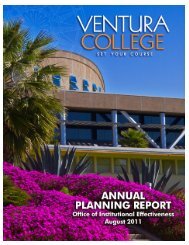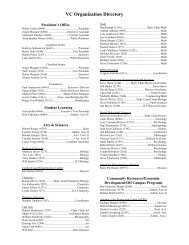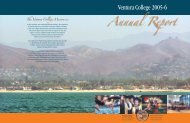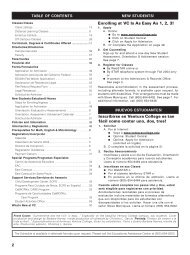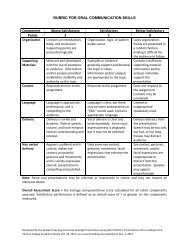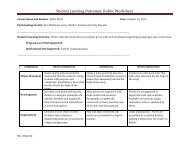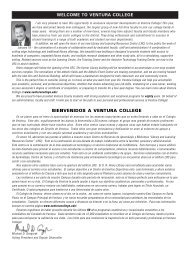2011 General CataloG & announCement of Courses - Ventura College
2011 General CataloG & announCement of Courses - Ventura College
2011 General CataloG & announCement of Courses - Ventura College
You also want an ePaper? Increase the reach of your titles
YUMPU automatically turns print PDFs into web optimized ePapers that Google loves.
ANNOUNCEMENT OF COURSES<br />
Course Identification<br />
A course identification is comprised <strong>of</strong> the course discipline name<br />
or abbreviated name and course number (for example, CJ V01).<br />
All course numbers for <strong>Ventura</strong> <strong>College</strong> will have a leading V (for<br />
<strong>Ventura</strong>) preceding the actual course number. <strong>Courses</strong> numbered<br />
1 (one) through 9 (nine) will also have a leading zero preceding<br />
the actual number. Sometimes an alphabetic character is appended<br />
to the course identification (for example, ART V12A).<br />
<strong>Courses</strong> requiring a year (two semesters) in which to complete the<br />
full <strong>of</strong>fering may be designated by number and letter (for example,<br />
BUS V01A-V01B). The A section <strong>of</strong> the course is usually <strong>of</strong>fered in<br />
the fall semester with the B section following in the spring; however,<br />
some year-sequence courses begin in the spring semester.<br />
The alphabetical designation in the course identification may also<br />
be used to designate the related topics <strong>of</strong> a year-long course (for<br />
example, HIST V18A-V18B); in this instance, the A course would<br />
not be a prerequisite to the B course and/or subsequent courses.<br />
Semester Unit Credit<br />
The semester unit credit <strong>of</strong> the course is shown by a number(s)<br />
following the title <strong>of</strong> the course. As defined elsewhere, the semester<br />
unit is based on three hours <strong>of</strong> workstudy; one lecture hour with<br />
two attendant hours <strong>of</strong> preparation or three hours <strong>of</strong> laboratory<br />
activity requiring special facilities or equipment.<br />
Most courses have fixed units; some have variable units. The unit<br />
value <strong>of</strong> each variable-unit course will be specified in the Schedule<br />
<strong>of</strong> Classes each term. In certain instances, to best serve students<br />
in summer term and in evening classes, the hours <strong>of</strong> instruction in<br />
some courses may be reduced and credit reduced proportionately.<br />
Course Prerequisites, Corequisites and<br />
Recommended Preparation<br />
A course prerequisite states the preparation required to<br />
successfully complete a particular course. A prerequisite represents<br />
a set <strong>of</strong> skills or a body <strong>of</strong> knowledge that a student must possess<br />
prior to enrollment and without which the student is highly unlikely<br />
to succeed in the course. For example, a student enrolling in<br />
general chemistry is likely to have grave difficulty without adequate<br />
preparation in algebra.<br />
A course corequisite states the course or courses in which a<br />
student must be concurrently enrolled. A corequisite represents a<br />
set <strong>of</strong> skills or a body <strong>of</strong> knowledge that a student must acquire<br />
through concurrent enrollment in another course and without which<br />
the student is highly unlikely to succeed in the course.<br />
Recommended preparation states the preparation suggested<br />
by the faculty to successfully complete a particular course.<br />
While encouraged to do so, students are not required to satisfy<br />
recommended preparation guidelines to enroll in a course.<br />
Course prerequisites, corequisites or recommended preparation<br />
are specified within course descriptions announced in this Catalog;<br />
they are also specified in the Schedule <strong>of</strong> Classes. A course has<br />
no prerequisites or corequisites unless so designated. Students<br />
must have successfully satisfied the prerequisite and/or corequisite<br />
requirements for all courses in which they enroll.<br />
CHALLENGING A PREREQUISITE OR COREQUISITE: It is<br />
recognized that students may have preparation equivalent to the<br />
stated prerequisites or corequisites or may wish to challenge<br />
a prerequisite or corequisite as allowed by state law. Students<br />
who believe they have met the prerequisite in ways other than by<br />
completing an equivalent course (for example, private instruction or<br />
on-the-job training) may file a petition. The Petition for Challenging<br />
a Prerequisite or Corequisite is available in the Assessment Office<br />
or the Counseling Office. The student shall bear the initial burden<br />
<strong>of</strong> showing that grounds exist for the challenge. The challenge<br />
process must be completed prior to the end <strong>of</strong> late registration.<br />
Students are encouraged to submit a prerequisite challenge seven<br />
workings days prior to the first day <strong>of</strong> class. The following is a list<br />
<strong>of</strong> the grounds under which a challenge may be pursued:<br />
1. The student will be subject to undue delay in attaining the<br />
goal <strong>of</strong> his or her educational plan because the prerequisite<br />
or corequisite course has not been made reasonably available<br />
(student educational plan must be on file).<br />
2. The prerequisite or corequisite is not valid because it is not<br />
necessary for success in the course for which it is required<br />
(student documentation required).<br />
3. The prerequisite or corequisite is unlawfully discriminatory<br />
or is being applied in an unlawfully discriminatory manner<br />
(student documentation required).<br />
4. The student has the knowledge or ability to succeed in the<br />
course despite not meeting the prerequisite or corequisite<br />
(student documentation required).<br />
Field Trips<br />
Field trips are required activities for a number <strong>of</strong> courses in the<br />
<strong>College</strong> curriculum. For any such courses, it is intended that they<br />
be clearly identified in the <strong>College</strong> Catalog and the Schedule <strong>of</strong><br />
Classes. For other courses, a field trip or an <strong>of</strong>f-campus activity<br />
may be optional for the students enrolled.<br />
According to policy adopted by the <strong>College</strong> District’s governing<br />
board, all persons making any type <strong>of</strong> field trip or excursion shall<br />
be deemed to have waived all claims for injury, accident, illness,<br />
or death during, or by reason <strong>of</strong>, the field trip or excursion.<br />
The <strong>College</strong> assumes no liability for students’ personal property.<br />
This includes course or related <strong>College</strong> activities, on campus, at<br />
<strong>of</strong>f-campus facilities, and college-sponsored field trips.<br />
Course Repetition<br />
A statement following the course description noting the repeat<br />
capability <strong>of</strong> a course will specify the maximum credit permitted<br />
for the designated course. The repeat capability will be expressed<br />
in maximum units and/or in total times the course may be taken.<br />
The absence <strong>of</strong> a repeat capability statement is always intended<br />
to designate a course which may be taken one time only.<br />
<strong>Ventura</strong> <strong>College</strong> Catalog 2010 - <strong>2011</strong> Announcement <strong>of</strong> <strong>Courses</strong> 69



